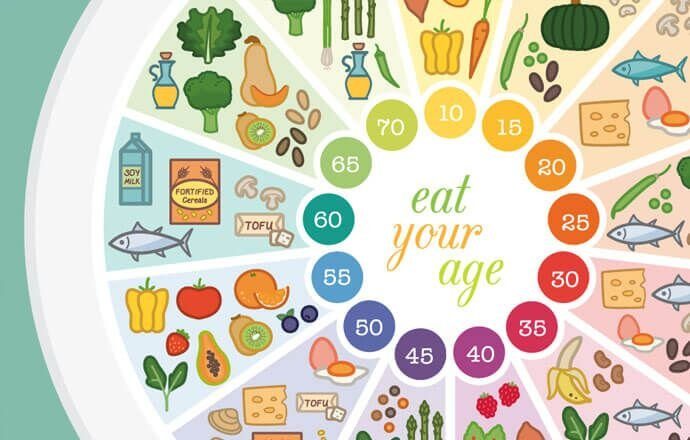Minimise bad habits – It’s time to re-check the food habits you may have adopted.
In your 30s – Think about prevention
What you do at this age will affect your future health, future risks from lifestyle-related health conditions including some forms of dementia, heart disease and type-2 diabetes can be reduced by cementing good dietary habits now.
Adopt healthy habits
Breakfast is the essential building block of a healthy diet; make sure it is nutrient-rich and made with good quality, fresh food. For a wholesome breakfast try an egg on toast with mashed avocado blend-ed with olive oil, pepper and garlic on toast. Alternatively, live yoghurt with nuts and dried fruit (e.g. 2-3 apricots) provides a healthy blend of nutrients.
Find healthy energy sources
Wherever possible, use fresh ingredients as they are unprocessed and unseasoned, which means they are likely to have better nutrient profiles.
Also try and make your meals from scratch. Strike a balance through the week with two portions of red meat, plus a variety of fish – including oily fish – at least once.
Use protein bases such as beans and nuts, as well as a variety of carbohydrates, including quinoa and sweet potato, for sustained and nutritious energy sources.
As we get older, the nutrient balance in our bodies needs to change
In your 40s – Prioritise rest and recovery
Now your body’s ageing mechanisms are becoming more active, you may notice your energy levels declining. Sleep is essential; promote a healthy sleeping pattern by reducing dependency on tea and coffee. This will calm your adrenal glands and allow a more stable sleep cycle. If you drink alcohol then be sure to have a few days where you don’t drink. Aside from other health implications, alcohol can inhibit sleep.
Minimise left-over bad habits – It’s time to re-check the food habits you’ve adopted. Age-related factors may mean that many functions begin to naturally decline, even without any additional health conditions.
Maintaining good health requires a little more effort for many of us. I find keeping a close eye on your blood sugar balance useful as excess sugar, if stored as fat, can affect weight. Much evidence also suggests this affects some hormone levels in women, too.
In your 50s:
Consider hormonal changes
Be ready for hormonal changes accompanying ageing; women approaching menopause may notice a marked weight shift, so make sure you keep your energy levels constant during these changes. Keep free sugar intake to 30g per day and avoid high sugar snacks.
Look after your bones
Many women will also be more vulnerable to conditions like osteoporosis. Make sure you eat plenty of dairy (as long as your system can digest it well) and leafy vegetables to get calcium and vitamin D into your system. Get out in the sun for 15 minutes a day in the sum-mer months to boost your vitamin D levels – important at any age but especially now.
Think about heart health
Heart problems can occur with increasing age and a balance of essential fatty acids (walnuts, salmon, sardines, soy beans, tofu, sprouts, cauliflower, flaxseed, etc) has been well documented to support cardiovascular health.Saturated fats can be lowered by eating alternatives to meat and avoiding processed fatty foods.
In your 60s
Give your diet a review
This is a good juncture to review and reset your dietary patterns, ensure that you are getting three square meals, and a good breakfast to bolster your energy levels throughout the day. Low energy and susceptibility to illness may be tell-tale signs of a poor diet.
Prioritise digestion
Many people in their sixties may also need digestive support, as digestive function may continue decline due to reduced saliva production and stomach acid. Probiotic foods include live yoghurt and fermented foods such as sauerkraut. Oats can support healthy digestion as a probiotic. You’ll also want to keep up your intake of B vitamins from wholegrains and seeds, and keep a richly varied diet with plenty of fruit and vegetables.
In your 70s and beyond
Keep eating little and often
You’ll be more aware of the ageing process in your seventies and eighties, but you can still manage a healthy diet to support you through the changes. Your appetite may decline over these years, and physiological functions will be slowing down. Recovery from illness may be slower and you may also be taking long-term medications to protect you against a variety of health risks associated with old age. Malnutrition is thought to affect 10% of the elderly in the UK, so above all enjoy your food and eat plenty.
Nutrient rich food is essential, and eating times become more important than earlier in life. To support digestion, avoid eating too late at night and eat plenty of vegetables such as turnips, kale and broccoli. Avoid raw foods, as stomach acid can decline with age too. Homemade soups and stews can be fantastic for retaining nutrients and easy to digest foods. If dentures pose an issue, easy-to-chew foods like soft vegetables, eggs, mashed potato, cottage cheese, yoghurt, etc, may help.
Sophie Murray, head of nutrition and hydration at Sunrise Senior Living UK and Gracewell Healthcare.










